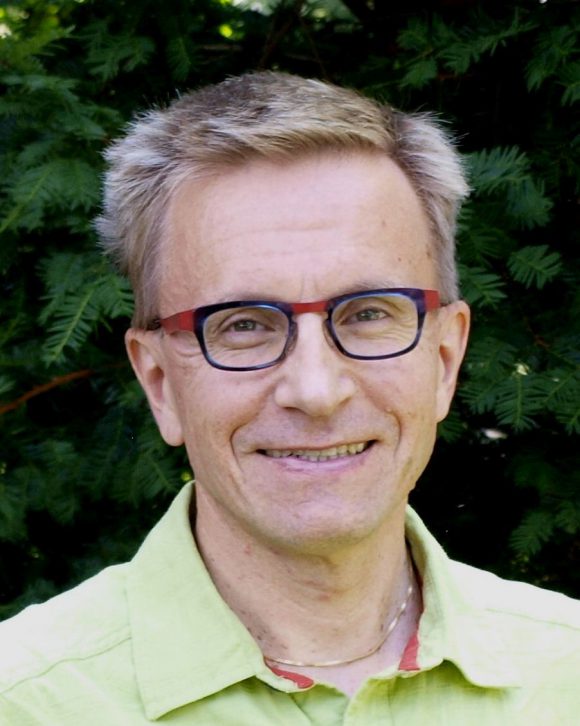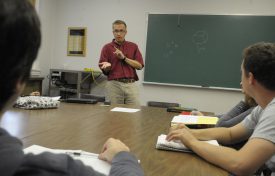
Max Häggblom.
Max Häggblom, distinguished professor and chair of the Department of Biochemistry and Microbiology, was named a US-Faculty Scholar for the 2016-2017 academic year by the Vietnam Education Foundation.
The Vietnam Education Foundation (VEF) is an independent U.S. Federal Government agency created by the U.S. Congress with the mission to strengthen the U.S.-Vietnam bilateral relationship through educational exchanges in the STEMM fields. Häggblom received a grant of $43,600 from the VEF U.S. Faculty Scholar Program to teach a course in environmental microbiology in Vietnam.
Häggblom will develop and teach the semester-long course “Environmental Microbiology in a Changing World” at Can Tho University (CTU) in southern Vietnam. The course, intended for upper level undergraduate and graduate students, will be structured around lectures, laboratory demonstrations, short research projects and student team projects, and will combine on-site teaching in Vietnam and interactive, real-time videoconferencing. Häggblom will co-teach the course with Dr. Duong Minh Vien (lecturer and vice head of the Department of Soil Science, CTU).
The purpose of this course is to provide students and young research staff with a fundamental knowledge about microorganisms in the natural and engineered environment, their role in the cycling of elements, and their ability to degrade both natural and anthropogenic chemicals in the environment. The course will emphasize the uniqueness of microbial biology, its enormous diversity, and the biochemical basis of microbial life. Students are expected to gain a fundamental understanding of how microorganisms are utilized and controlled for the benefit of humankind and will develop the skills needed to study these applications which include, for example, the principles governing bioremediation processes for treatment of contaminated soils, sediments and aquifers. Quantitative analysis and communication skills will be gained through team projects. The knowledge gained by the participants in the course will enable them to take a modern approach to their teaching and research work.

Max Haggblom lecturing on microbial techniques.
Häggblom has on-going research collaborations with Duong on the biodegradation of chlorinated pesticides and dioxins and on the activity of arsenic-transforming bacteria in the Mekong Delta. Duong was a VEF-funded Visiting Scholar at Rutgers University in 2008-2009 working on anaerobic dechlorination of polychlorinated dibenzo-p-dioxins. The Mekong river delta is a very important agricultural area for Vietnam and South East Asia. The Mekong river delta is facing pollution problems from agricultural and industrial activities such as wastes of agricultural processing and production. The misuse of pesticides is also an environmental problem, resulting in water and soil pollution, and in the loss of beneficial soil and aquatic organisms. Arsenic contamination of groundwater is of serious concern in many regions of Southeast Asia including the Mekong Delta and threatens the health of the exposed populations. In addition, polychlorinated dibenzo-p-dioxin pollution in some areas sprayed with Agent Orange during the Vietnam War is still an unsolved environmental issue. Mitigation of these issues will contribute to the sustainable development of agriculture in the Mekong river delta as well as to reduce the threat of these pollutants to human health. The application of microbial technology to deal with these pollution issues is considered highly feasible. However, the research activities and application in these issues are still restricted in term of research capability and knowledge of local scientists on using modern microbial methods and technology. Particularly, young scientists and graduate students need to be equipped with new knowledge and laboratory skills for modern methods used in the field of environmental microbiology.
Can Tho University (CTU), established in 1966, is recognized as a premier university in the Mekong Delta of Vietnam. Can Tho University targets to be one of the leading higher education institutions in Vietnam and is recognized as one of the top universities in Asia-Pacific in training and research in 2022. CTU has an enrollment of about 54,000 undergraduate students, 3,000 M.S. students, and around 300 Ph.D. candidates. CTU has over 2,000 staff members including nearly 1,200 teaching staff and 800 supporting staff. The College of Agriculture and Applied Biology at CTU has given high priority to education and research to solve the present and emerging problems in sustainable agriculture. This provides an excellent fit and synergy with the School of Environmental and Biological Sciences and the New Jersey Agricultural Experiment Station of Rutgers University in New Brunswick, New Jersey. Research in the Department of Soil Sciences addresses some of the most pressing challenges in the Mekong delta, including increasing pollution in soil and in water caused by extensive use of chemical fertilizers and pesticides in cultivation, increasing soil degradation due to declining soil organic matter and over exploiting soil for rice production.
The Environmental Microbiology course will be important for capacity building at CTU and be linked to the some currently offered courses in the graduate program of Soil Science in CTU. Therefore, the knowledge and experience gained can improve the teaching quality of these courses at CTU. Häggblom will provide guidance in course development at the interface of environmental and biological sciences and especially approaches to further develop and enhance active learning through homework, group projects and research experiences.

